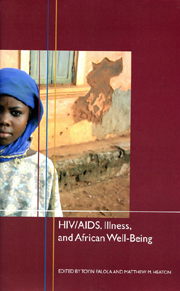Book contents
- Frontmatter
- Contents
- Acknowledgments
- Part I Context
- Part II Illness Case Studies
- Part III Globalization, Development, and Health
- 7 The Microbial Rebellion: Trends and Containment of Antimicrobial Resistance in Africa
- 8 Development and the Epidemiologic Transition in Sub-Saharan Africa
- 9 The Economic Burden of Buruli Ulcer Disease on Households in Rural Ghana
- 10 Health Issues in a Mining Community in South Africa
- 11 Globalization, Health, and the Hajj: The West African Pilgrimage Scheme, 1919–38
- Part IV HIV/AIDS
- List of Contributors
- Index
- Rochester Studies in African History and the Diaspora
11 - Globalization, Health, and the Hajj: The West African Pilgrimage Scheme, 1919–38
from Part III - Globalization, Development, and Health
Published online by Cambridge University Press: 05 February 2013
- Frontmatter
- Contents
- Acknowledgments
- Part I Context
- Part II Illness Case Studies
- Part III Globalization, Development, and Health
- 7 The Microbial Rebellion: Trends and Containment of Antimicrobial Resistance in Africa
- 8 Development and the Epidemiologic Transition in Sub-Saharan Africa
- 9 The Economic Burden of Buruli Ulcer Disease on Households in Rural Ghana
- 10 Health Issues in a Mining Community in South Africa
- 11 Globalization, Health, and the Hajj: The West African Pilgrimage Scheme, 1919–38
- Part IV HIV/AIDS
- List of Contributors
- Index
- Rochester Studies in African History and the Diaspora
Summary
International regulation of the West African overland pilgrimage from northern Nigeria to Mecca had its basis in concerns of British colonial officers and Saudi Arabian authorities to promote the health and well-being of itinerant Nigerian Muslims en route to Mecca in the first half of the twentieth century. Regulations enacted to control the West African pilgrimage in the period between 1919 and 1936, dubbed the Nigerian Pilgrimage Scheme, were adapted from regulations previously attempted in India, the Straits Settlement [Singapore], and Indonesia and were meant to bring the West African pilgrimage into conformity with international standards established and modified since the Third International Sanitary Conference in Constantinople in 1866. Because of the historically international nature of pilgrimage control schemes and the transnational nature of the Islamic pilgrimage to Mecca, the Nigerian Pilgrimage Scheme is a useful case study of the history of globalization in Africa and the effects that concerns for global health have had on efforts to control the globalization process. This chapter seeks to rethink several key assumptions about both the relationship between health and globalization and the effects that globalization has had on Africa through a discussion of the motivations and processes of the Nigerian Pilgrimage Scheme of the early twentieth century.
- Type
- Chapter
- Information
- HIV/AIDS, Illness, and African Well-Being , pp. 243 - 268Publisher: Boydell & BrewerPrint publication year: 2007

